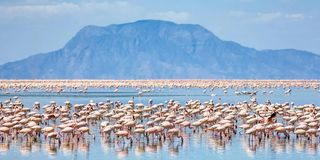
Arusha. Tanzania is poised to make a major impact in the global natural soda ash market with its ambitious project in the Arusha Region.
The project, which is set to begin production in 2027, aims to produce 500,000 tonnes of soda ash annually, positioning Tanzania as the third-largest producer in the world, trailing only behind the United States and Turkey.
With this strategic initiative, Tanzania is set to surpass Kenya, which currently leads in Africa with an annual production capacity of around 280,000 to 300,000 tonnes.
By tapping into the growing global soda ash market, which is expected to reach 560 million tonnes by 2028, Tanzania stands to benefit economically and enhance its position as a major player in the industry.
The project is being spearheaded by the National Development Company (NDC) and will cover an extensive 60,884-acre area in Engaruka Ward, Monduli District.
This marks a significant leap for Tanzania in securing its role in the soda ash production sector while contributing to regional and global trade.
As part of the project’s implementation, the Tanzanian government has compensated 595 residents across four villages—Engaruka-Chini, Mbaash, Idonyo Nado, and Irerendeni—amounting to $5.8 million (Sh15.08 billion).
Industry and Trade Minister Dr Selemani Jafo officially handed over the compensation to the residents and highlighted the broader benefits of the project.
"This plant will allow us to export soda ash within Africa and overseas. It will also save the country significant expenses on soda ash imports, which amounts to $121 million (314.6 billion) annually," said Dr Jafo.
The compensation funds are split, with $2.5 million (Sh6.5 billion) designated for the affected residents and the remaining $3.3 million (Sh8.58 billion) earmarked for community development projects in the area.
The Monduli District Commissioner, Mr Festo Kiswaga, confirmed that the area has been cleared and fenced, ready for the project’s commencement.
NDC Director Dr Nicolaus Shombe noted that it took over 29 years of research to identify the area’s natural resources, revealing the 3.8 billion cubic meters, equivalent to 787 million metric tonnes of natural soda ash reserves.
The total cost for establishing two large soda ash extraction plants in Engaruka will be $640 million (Sh1.66 trillion).
Soda ash is a key raw material in the glass manufacturing industry and is also used in soap and detergent production, pulp processing, and paper bleaching.
Soda ash is also used in the food industry as an acidity regulator, anti-caking agent, and stabilizer in products like baked goods and beverages.
The project’s manager, Mr Godfrey Mahundi, mentioned that the process of attracting potential investors was underway, with several enterprises expressing interest.
"We plan to start with 500,000 metric tonnes in production and scale up as demand increases," said Mr Mahundi.
The project’s initial site at Lake Natron was abandoned after environmental concerns about flamingo breeding sites.
The new location in Engaruka has resolved these issues, distancing the project from protected ecological areas.
This strategic move could significantly boost Tanzania’s industrial capacity and economic growth and position the country as the global market leader.

